|
|
|
Sort Order |
|
|
|
Items / Page
|
|
|
|
|
|
|
| Srl | Item |
| 1 |
ID:
103964
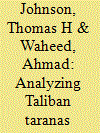

|
|
|
|
|
| Publication |
2011.
|
| Summary/Abstract |
This article describes and analyzes a little understood Afghan Taliban propaganda tool: chants or taranas. These melodic refrains effectively use historical narratives, symbology, and iconic portraits. The chants are engendered in emotions of sorrow, pride, desperation, hope, and complaints to mobilize and convince the Afghan population of the Taliban's worldview. The chants represent culturally relevant and simple messages that are communicated in a narrative and poetic form that is familiar to and resonates with the local people. They are virtually impossible for the United States and NATO to counter because of Western sensitivities concerning religious themes that dominate the Taliban narrative space, not to mention the lack of Western linguistic capabilities, including the understanding and mastering the poetic nature of local dialects.
|
|
|
|
|
|
|
|
|
|
|
|
|
|
|
|
| 2 |
ID:
103971
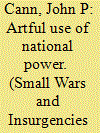

|
|
|
|
|
| Publication |
2011.
|
| Summary/Abstract |
In its colony of Angola, Portugal during its colonial wars (1961-1974) was able to exploit the economic dependence and divided population loyalties of its hostile neighbours the Congo and Zambia as well as the cleavages within the nationalist movements to prevent a crippling insurgency. The rulers of both countries were largely dependent on Angola for trade, and were eager to have the side effects of the robust Angolan economy with its 11% annual growth brush off on their own moribund ones. While relationships were never comfortable, the sponsors of revolution were forced to reign in their 'freedom fighters' in order to maintain the functioning of their export-dependent economies. Portuguese leadership also played a vital role, as it was able to bring together diverse elements of national power in a concerted policy for dealing with these enemies, whether they were insurgents or their sanctuary countries. This policy of leveraging national power and playing on the vulnerabilities of its opponents worked well during its war in Angola and still holds valuable lessons for countries that find themselves in similar circumstances.
|
|
|
|
|
|
|
|
|
|
|
|
|
|
|
|
| 3 |
ID:
103969
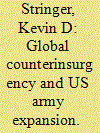

|
|
|
|
|
| Publication |
2011.
|
| Summary/Abstract |
Given the nature of global counterinsurgency operations, the demands of military expansion, and the need for cultural, linguistic, and regional expertise, the United States Army should evaluate the establishment of US-led foreign troop units for its evolving force structure. This article proposes the creation of an American foreign legion based upon the recruitment of US-led, ethnically homogeneous tribal force units to meet the grist mill of counterinsurgency operations. This structured approach would be more beneficial than the current reliance on a de facto American Foreign Legion, represented by private military contractors (PMCs), many of them comprised of foreigners. These PMCs carry a number of oversight, accountability, and legal risks not found in a fully integrated, and US-officered foreign legion. The British Brigade of Gurkhas, the South-West African Police Counter-Insurgency Unit (Koevoet), and the Kit Carson Scouts serve as relevant historical examples where foreign troops were used to supplement national manpower resources.
|
|
|
|
|
|
|
|
|
|
|
|
|
|
|
|
| 4 |
ID:
103968
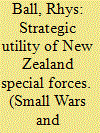

|
|
|
|
|
| Publication |
2011.
|
| Summary/Abstract |
In 1955, the New Zealand government authorised the creation of a Special Forces unit to operate with British forces in Malaya to counter a communist-inspired guerrilla insurgency. Drawing upon the operational experiences of the New Zealand SAS largely taken from the Cold War period, and underpinned by Colin Gray's Special Forces essentials of 'economy of force' and 'expansion of choice', this article will show how New Zealand's SAS is now accepted not only as a respected and relevant part of the nation's military capability, but also empowers its political decision-makers with the confidence to take on significant, and at times difficult, strategic foreign-policy choices.
|
|
|
|
|
|
|
|
|
|
|
|
|
|
|
|
| 5 |
ID:
103966
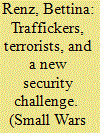

|
|
|
|
|
| Publication |
2011.
|
| Summary/Abstract |
The collapse of the Soviet Union precipitated the massive expansion of drug use and trade in Russia. The country now has one of the largest populations of injecting drug users in the world and has become the largest single-country market for Afghan heroin. In 2003 the Federal Service for the Control of the Drugs Trade was created to coordinate a comprehensive counternarcotics strategy appropriate to the scale of this threat. The service continues to face a number of challenges in its early stages of development. However, it has made considerable advances in improving responses to large-scale organised crime and in building international cooperation.
|
|
|
|
|
|
|
|
|
|
|
|
|
|
|
|
| 6 |
ID:
103967
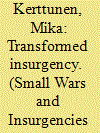

|
|
|
|
|
| Publication |
2011.
|
| Summary/Abstract |
This paper examines the insurgency in Nepal (1996-2008) from a military theoretical point of view. It looks at the insurgency from Andre Beaufre's exterior/interior framework, which is modified to match postmodern conflicts. Simultaneously the importance of the political is underlined. The author critically examines the relevance of the Maoist label the movement and insurgency have received. He claims that the insurgency became a hybrid consisting of Chinese, Latin American, and Leninist thoughts wrapped in pragmatic/revisionists and nationalist ideas. The author also suggests that the ability of insurgents - or counter-insurgents - to combine the effects of the exterior and interior is more likely to constitute the key centre of gravity of a conflict than any single political, economic, or military factor.
|
|
|
|
|
|
|
|
|
|
|
|
|
|
|
|
| 7 |
ID:
103965
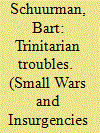

|
|
|
|
|
| Publication |
2011.
|
| Summary/Abstract |
It seems paradoxical that powerful Western states are at their most vulnerable when the disparity in military capabilities between them and their opponents is at its largest. Yet it is precisely in such 'asymmetric conflicts' that Western countries have failed to achieve their overall political objectives the most often. Focusing on the post-1945 world, this article will examine governmental, military, and societal reasons for Western failures in asymmetric conflicts. Politicians' lack of understanding regarding war's fundamental nature, militaries' tendency to dissociate operational goals from grand strategy objectives and citizens' moral aversion to warfare appear to be among the main obstacles to success.
|
|
|
|
|
|
|
|
|
|
|
|
|
|
|
|
| 8 |
ID:
103970


|
|
|
|
|
| Publication |
2011.
|
| Summary/Abstract |
The strategy of 'winning hearts and minds' is considered key to successful counterinsurgency, but it often works at the expense of political control over the course of war. This happens when the strategy requires the counterinsurgent to work with a local nationalist group that takes advantage of its lack of access to civilians. This exposes the counterinsurgent to a dilemma inherent in the strategy; because working with the group is a crucial part of the strategy, victory would be impossible without it. Yet when the strategy is implemented through the group, it compromises the policy it serves. I show how this dilemma undermined British political control during the Malayan Emergency.
|
|
|
|
|
|
|
|
|
|
|
|
|
|
|
|
|
|
|
|
|